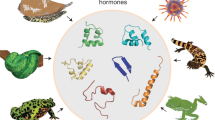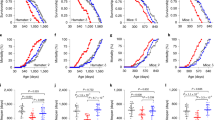Abstract
PROF. MACLEOD, in his address on insulin, reported in the Lancet, 1923, ii. pp. 198–204, at the eleventh International Congress of Physiology, while pointing out that frogs can resist “massive” doses of insulin, directed attention also to Krogh's observation that insulin convulsions actually do occur in frogs three or four days after injection, but suggested no explanation of this apparently remarkable fact. Is insulin itself affected by low temperature, or is the carbohydrate and fat metabolism of a frog so low as compared with a mammal that insulin takes longer to act? The following experiments throw some light on the problem.
This is a preview of subscription content, access via your institution
Access options
Subscribe to this journal
Receive 51 print issues and online access
$199.00 per year
only $3.90 per issue
Buy this article
- Purchase on Springer Link
- Instant access to full article PDF
Prices may be subject to local taxes which are calculated during checkout
Similar content being viewed by others
References
Amer. Journ. Physiol., vol. 66, pp. 437–444, 1923.
Author information
Authors and Affiliations
Rights and permissions
About this article
Cite this article
HUXLEY, J., FULTON, J. The Influence of Temperature on the Action of Insulin. Nature 113, 234–235 (1924). https://doi.org/10.1038/113234a0
Issue Date:
DOI: https://doi.org/10.1038/113234a0
This article is cited by
-
Studies on carbohydrates in reptiles
Zeitschrift f�r Vergleichende Physiologie (1962)
-
Action of Insulin on the Frog (Rana temporaria)
Nature (1953)
-
Insulin
Ergebnisse der Physiologie (1925)
Comments
By submitting a comment you agree to abide by our Terms and Community Guidelines. If you find something abusive or that does not comply with our terms or guidelines please flag it as inappropriate.



